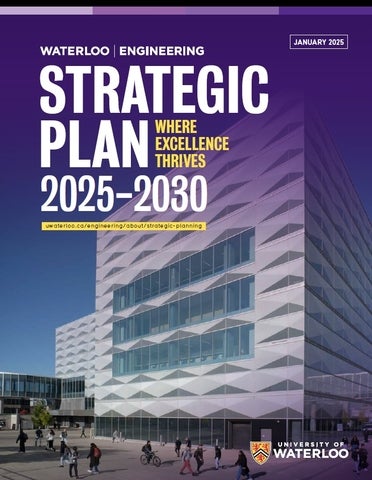In its latest strategic plan, Waterloo Engineering is not only preparing for the future—it’s creating it.
Guided by the long-term vision of Waterloo at 100, the Faculty of Engineering’s 2025–2030 strategic plan, Where Excellence Thrives, calls on the Faculty to go beyond solving real-world challenges and to take a leadership role in developing innovative solutions that benefit the global community.
"This plan is more than a list of goals—it reflects our shared journey toward achieving a bold vision for Waterloo at 100," said Dean Mary Wells. "It captures what makes us extraordinary and amplifies the idea that our potential at Waterloo Engineering is limitless.
Defining the path foward
At the heart of Where Excellence Thrives are four interconnected themes: culture, graduates, knowledge, and campus. Together, they reflect the Faculty’s bold ambition to shape the future and redefine what’s possible. Dr. Maya Przybylski, O'Donovan Director of the School of Architecture, designed the plan’s circular symbol to emphasize the unity and strength that comes from weaving them together.
The vision is ambitious. All undergraduate students will engage in faculty-led research, gaining valuable hands-on experience before graduation—a cornerstone of Waterloo’s commitment to experiential learning. Graduate students will benefit from learning and campus resources designed to cultivate career-defining skills, preparing them to excel in either academia or the broader professional world.
Faculty collaboration will also evolve with the introduction of dynamic “third spaces”—creative hubs designed to inspire innovation and build connections beyond traditional academic settings. And, with an aim to achieve record-breaking funding, the Faculty is more committed than ever to enable ground-breaking advancements for a better future.

Where Excellence Thrives, the Faculty of Engineering's 2025-2030 strategic plan, launched on January 6, 2025.
The power of listening
Led by Wells and Veronica Michael, the Faculty’s director of integrated planning, the Faculty embarked on an extensive journey of consultation where students, faculty, staff, alumni and industry partners offered feedback on how to make the strategic plan most relevant to real-world problem-solving.
Many strategies—from employee and student surveys, departmental strategic planning retreats, presentations to trusted advisory groups, open consultation sessions and discussions at the Dean’s weekly Coffee & Conversation gatherings—were enacted to ensure every voice was reflected in the final plan.
Alongside Wells and Michael, Waterloo Engineering's chairs, school directors, associate deans and senior staff collaborated closely with their teams to align departmental goals with the Faculty’s overarching aspirations, ensuring everyone felt connected to the vision.
Looking ahead
As the plan is set to begin action, Wells is excited about the Faculty’s future. "This is more than a plan—it’s our commitment to excellence, to our community, and to the world,” says Wells.
“And it renews my promise as dean to ensure that Waterloo Engineering doesn’t just respond to change, but that we lead it.”